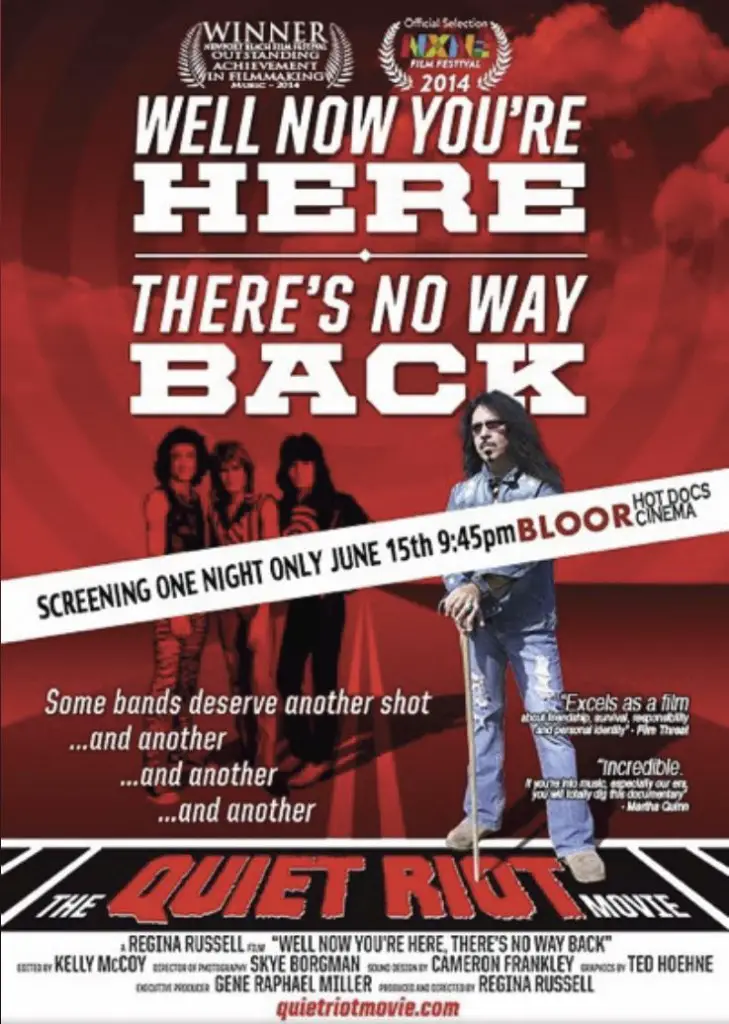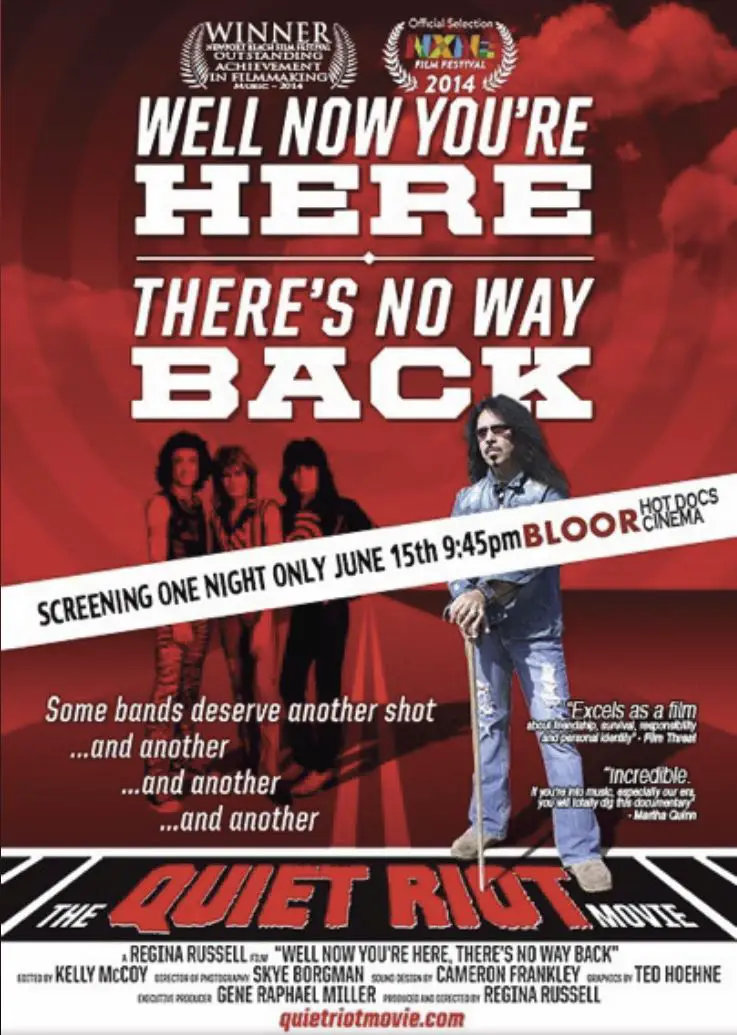
The Quiet Riot Interview
[Correspondent Julia Wallace was dispatched to speak with Frankie Banali of Quiet Riot on the eve of the Toronto premiere of the new documentary,Well Now You’re Here, There’s No Way Back.-AC]
In the early 1980s, Quiet Riot took the world by storm. In the 30-plus years since, drummer and band manager Frankie Banali has dealt with the loss of his best friend and Quiet Riot lead singer Kevin Dubrow, his mother, and his ex-wife.
The story of Quiet Riot and Frankie Banali has been documented by his fiancée, filmmaker Regina Russell, in Well Now You’re Here, There’s No Way Back – an honest and surprisingly intimate documentary that reveals Banali’s strength as an individual coping with loss, as well as his determination to carry on making music with Quiet Riot. Julia spoke to Banali and Russell about about working together, Quiet Riot’s legacy, coping with loss, and moving forward.
Well Now You’re Here, There’s No Way Back plays at the Bloor Hot Docs Cinema in Toronto on June 15 as part of NXNE. For more information visit http://www.quietriotmovie.com/.
First of all, I’d like to congratulate the two of you on both this film and your engagement! Frankie, was it easier for you to revisit some of the darker parts of your past knowing it was someone you trust – your fiancée – behind the wheel?
FB: Well you know, it’s… I live in the moment rather than in the past, so actually sitting there and looking at a lot of the home movies, and the articles, and the awards and all those things was definitely a different thing for me, because I lived it, but you know, it just brings a lot of those moments – you know, both good and bad – to the forefront.
Absolutely. Did it put any pressure on you guys? Did you have to work through anything again? Or were you just strictly in the moment, putting the past in the past?
RR: There was some pressure on us because it’s hard to, um… it’s hard to explain to someone that it’s a good thing to open up and show their vulnerabilities. It’s a hard thing to do in front of a camera, and he had a lot of trust in me in that he knew that I wasn’t going to betray him in any way, and that he could see it first. And there was a lot of moments when he would’ve rather me not be filming, but when it was all put together, he saw, and there was nothing that he objected to because he could see that showing his vulnerability actually brought you – the viewer – in closer, and I feel like it brings the audience more on his side. They get to see his struggles.
Yeah. One of the things that’s really striking about the movie is how honest it is. It’s surprising – I wasn’t expecting that going in. So Frankie, how did you feel about learning to open up in front of the camera like that after such a long time?
FB: Well, the thing for me is I wanted to ensure that it was an honest film. So while there were some things that, you know, I wasn’t prepared for, and there were some moments in there that, you know, perhaps, when they were happening and then I saw them after the fact I thought – I’m saying to myself ‘I don’t know if I want people to see me in that light’ – especially some of the angry moments. But at the same time, you know if you’re going to make a film and you’re going to make it honest, and you’re going to make it real, then you have to see all sides of the equation. So there were a lot of things that I let go. I just let Regina make the film that she wanted to make without me saying ‘no you can’t do that.’
What were the hardest parts for you to accept were going to be put in front of an audience?
FB: Mmm. You know [pause] going to Kevin’s gravesite, because that is something that I do… I don’t go there on the anniversary of his passing. I go there generally on his birthday and then sometimes I just go for absolutely no reason, but those are very private moments that are no longer private. Now how I view it is that it really makes Kevin’s death real. There’s one thing about reading about it, there’s one thing about seeing a news report about it, but there’s another thing altogether about actually seeing the gravesite itself. So it really brings that to the forefront.
Another thing that’s really amazing about the film is how open you are about the many losses you’ve had in your life and how they have affected you. Do you feel like throughout the process you’ve found peace?
FB: Um… I don’t know. I guess in some ways it has, but you know, loss is something that you live with forever. You learn to accept it, but you don’t necessarily… um, ever feel good about it. You just have to accept it because you have no choice.
Yes. Grief never goes away. It just changes.
FB: Yes. Exactly.
So one of the things that I found really interesting is how you guys explored your ability to focus on a piece of art – just a single piece of art – when you felt like things were getting too heavy. I think that’s amazing, and it’s something a lot of people can learn from, the ability to stop and focus and listen to yourself. Why do you think doing that works for you and how did you learn to do it?
FB: The thing for me is that I’m a very, very focused person. Because I’ve managed the band for over 20 years, but I’ve been in the band for well over 30 years, um, I can separate my emotions and my particular focus at anytime because I have to. I’m responsible for a lot of things and a lot of people.
Another thing that was really interesting to me about this movie was that you had members of Miles Davis’ family interviewed in a film about Quiet Riot, when it seems like the two couldn’t be any further apart. What’s the connection?
FB: You know it’s interesting, because Miles’ nephew was Miles Davis’ drummer in the 1980s, but he’s a fan of the ‘80s genre and he likes me as a person and he likes my drumming, so that’s the connection with Vince. And then…
RR: [Jumping in] With Erin! Erin Davis is a huge Quiet Riot fan. In the ‘80s, Erin was listening to Quiet Riot in his house and talking to his dad about it. And Frankie is a huge Miles Davis fan.
I thought it was really amazing you were able to show them, because music fans are music fans. Now, you’re premiering the movie in Canada this weekend…You guys used Kickstarter to raise money for the film. What was that experience like? Were you thinking of giving up at any point?
RR: I was never thinking of giving up, but I definitely would not have been able to give up because I’d already promised… I’d publicly promised to make this movie, so I definitely never could have given up on it. I never wanted to.
What was the response you got from the Kickstarter campaign? Was it mostly fan contributions? I know that Kevin’s mother contributed.
RR: It was some fans, some family, and some friends. Overall we got a really good response. I mean, it was very early – nobody was doing crowdfunding at that time, so there was a little bit of, you know, people kind of all aghast and like ‘why are you asking the public to fund your movie?’ kind of thing. Now everyone does it, but at that point it was a little weird to some people, but we did make our goal, and we made a great movie. Some of the people that were contributors came to the premiere, and they seemed very happy.
That’s great. The movie touches on so many things that I think the media sort of looked over. One of the things that I think people will be really shocked to discover is that Metal Health wasn’t just the first metal album to hit number one on Billboard, it also bumped Thriller out of that spot. Do you feel like Quiet Riot doesn’t get the recognition it deserves? You broke down a lot of walls for the genre.
FB: Well, you know, when you think about it we had to hurdle over Michael Jackson’s Thriller and The Police’s Synchronicity at a time when The Police were huge, and Lionel Richie, who was all over MTV and MuchMusic in Canada, and we managed to do that. I think part of the problem is still that when it comes to hard rock/heavy metal bands like Quiet Riot, one of the reasons I think the fans love the band so much is because we were the band that the parents hated. We were the band that the establishment hated. But there’s a price to pay for that. In 1983, when the Metal Health record went to number one, we should have been nominated for a Grammy. I mean, that was a no-brainer, but we were completely and totally snubbed by the Grammy Committee and completely overlooked. And you know it was a ridiculous accomplishment that we made that nobody wanted to recognize, even though it was right in front of their faces.
Are you hoping that this film is going to remind people of what you did?
FB: I’m hoping that it will remind them. I’m hoping that the people who just didn’t realize the magnitude of what Quiet Riot accomplished, um, will get to see that side of it, but they’ll also get to see what it’s really like to be in a band. It’s not all champagne and caviar and Learjets… [laughs] there’s a lot more to it.
Oh absolutely. Do you remember where you were when you got the news that you guys had reached number one?
FB: Absolutely! We were playing in Rockford, Illinois, and it was uh, I think it was the day after my birthday [11/14/51 and we were opening up for Black Sabbath. They were on the Born Again tour, and I remember that Rick Nielsen from Cheap Trick had called up our management company because his kids were Quiet Riot fans, and he’s from Rockford, Illinois, and they wanted to come to the show. So I remember exactly what it was like, um, and you know, it was interesting because our record was going number one the following week – you get the numbers a week early – so we find out that the record is going to number one the following week, and yet we’re opening up for Black Sabbath [laughs].
And now you’re back on the road. So you’ve been touring again with your third singer in the past four years. Are you still feeling optimistic? I really liked how in the film you said ‘my dad told me that you can either do something or do nothing.’ Do you still feel that momentum?
FB: I’m pretty much unstoppable once I set my mind to something, and I think it’s worth understanding that, you know, since 1980, three years before the Metal Health record came out, I started playing with Kevin, um, and Quiet Riot has always been my focus. It’s always been what drives me as far as music is concerned, and that has not changed at all. I will go toe to toe with anyone that gets in my way.
Is that a way for you to sort of carry Kevin’s spirit? That was his mentality when you guys were starting out.
FB: Yeah – it’s important to me because Kevin and I were always the nucleus of that band, and we basically… anytime anyone told us we couldn’t do something, we would exactly do what they told us we couldn’t do. And there’s not a day that goes by that I don’t feel Kevin’s presence, so to continue Quiet Riot continues not just the band, but the music and his legacy and his memory, and that is very important to me.
I think that’s excellent. And what about the new album in the works?
FB: Yes, as a matter of fact it should come out the 24th of this month. That’s the day that I have slated – give or take a day.
Great. What about you Regina? Do you think you’re going to move into documentary filmmaking and away from fashion?
RR: I think I probably will make more documentaries. I do really want to make a scripted film. I feel like with my next film I’m really leaning towards doing something scripted, although never say never, and who knows what can happen [laughs], but I feel like I want to move more into scripted and see what happens in the future with documentaries. I mean, I love documentaries so much and I can’t imagine that I wouldn’t make another one some day, but I don’t think that would be my next project.
Would you guys work together again?
RR: Oh yeah. Absolutely.



